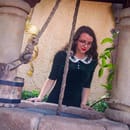“It always shocked me when I realized that I wasn’t the only person in the world who thought and felt such strange and awful things.”
On Oct. 18, Hulu released a miniseries adapting John Green’s Looking for Alaska to mostly glowing reviews, with a 89% score on Rotten Tomatoes.
LaToya Ferguson of Indiewire praised its straightforward approach to a coming of age story and called it “a love letter” to The O.C., which, like Looking for Alaska, was created for television by Josh Schwartz.
“In a sea of fizzle rocks- amped teen shows, Looking for Alaska is a cup of melancholy chamomile tea sipped while staring wistfully out of a window,” stated Ariana Romero of Refinery29. She went on to praise cast’s ability to make viewers feel the “very high highs and the very low lows of teendom.”
Not all critics loved Looking for Alaska, however. Writing for The New York Times, Margaret Lyons felt the show was “nostalgic for itself, like it’s admiring itself in a mirror instead of making eye contact.”
Young adult-oriented content receives a lot of scrutiny. A professor of mine once told me a story about the first time she met a professor from another department. They discussed their work outside of teaching, and he asked her what genre she writes. When my professor told him she writes children’s and young adult fiction, he replied with a patronizing “that’s okay.”
Whether or not the genre deserves such distaste is a matter of opinion. Some think that books such Looking for Alaska or 13 Reasons Why are too dark for young readers, while the same critics consider The Fault in Our Stars too melodramatic for adults to enjoy.
When I myself was a teenager, it felt like adults simultaneously wanted us to behave like adults and remain children, as if the two options for dealing with teens were limited to patronizing or shaming. In the shadow of the mid-2000s explosion of emo culture, parents were quick to assume that their teens were hurting themselves because of something Gerard Way sang without realizing that style of music was the bandage not the blade.
In much the same way, Looking for Alaska developed a history of being banned. Its characters drink and smoke and cuss and have sex, like real teenagers often do. As a result, the novel appeared on lists of Frequently Challenged Books curated by the American Library Association not once or twice but five times, and numerous counties have either banned it from their libraries or from use in the classroom.
The most notable case seeking to ban Looking for Alaska on grounds of pornography took place in Buffalo, New York in 2008. Parents called for the book’s removal from eleventh grade curriculum at Depew High School, and the school board voted in favor of the novel due to its relevance to the struggles of adolescence, but not before John Green himself had a chance to respond.
In January of 2008, Green posted a video entitled “I Am Not A Pornographer” on his wildly popular YouTube channel, Vlogbrothers, which he shares with his brother, Hank. He countered the concerns that his book was pornographic by pointing out that the one sex scene in his book was “awkward, un-fun, disastrous, and wholly unerotic.” The only reason it exists is “to draw a contrast between that scene, when there is a lot of physical intimacy but it’s ultimately very emotionally empty, and the scene that immediately follows it, when there’s not a serious physical interaction, but there’s this intense emotional connection.”
“The argument here is that physical intimacy can never stand in for emotional closeness,” Green continued. His message towards people who think that young readers cannot grasp that concept was as follows: “shut up and stop condescending to teenagers.”
I have never driven while drunk, smoked, or even gotten into serious trouble at school or legally, but if I had done any of those things, it wouldn’t be because I got the idea from John Green. Alternatively, I grew up reading Green’s books, and it would not be an exaggeration to say that they had a profound impact on me.
Looking for Alaska is a heartfelt yet honest exploration of friendship, grief, and the meaning of life through the lens of an average teenage boy and his group of “outsider” friends. Its characters are complex, mostly intelligent, and well-rounded. Their age is a factor in who they are, but it doesn’t define every aspect of their personalities. Their struggles are as real to them as those of any adult, and they’re treated as such.
Reading Green’s words, I knew I was being talked to, not down to. Watching the new series brought back the tears, the laughs, the sighs of worry and relief alike, everything I felt when I read the book years ago. Most importantly, I remembered a lesson that I am still learning, one for those of any age: “we need never be hopeless because we can never be irreparably broken.”
So watch Looking for Alaska or don’t. Read it or don’t. Those decisions are up to you. All I ask is that you don’t write it off because it’s written for young people about young people.



